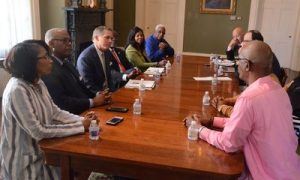U.S. Rep. Hill’s bill would offer grants for ex-inmates at HBCUs
by September 9, 2019 1:07 am 916 views

U.S. Rep. French Hill, R-Little Rock, says historically black colleges and universities (HBCUs) can be “a key arrow in the quiver” for helping prisoners re-enter society successfully, so he’s hoping to redirect $5 million in Department of Justice grants toward programs run by those schools.
Hopefully, doing so will create more success stories like Terrance Knowlton, who spent three years in prison for selling drugs and is earning an associate’s degree in entrepreneurship at Shorter College.
Hill’s “Shift Back to Society Act” would establish a pilot program authorizing the DOJ to award discretionary grants to HBCUs to create innovative programs for inmates and offenders who are transitioning back to society. It would use already appropriated DOJ funds.
The funding could create pilot programs that help determine best practices for widespread use. Hill wants community coalitions to scale up programs.
He plans to introduce it Monday (Sept. 9). It has five co-sponsors, including Rep. Cedric Richmond, D-La., former chairman of the Congressional Black Caucus. Hill is vice chairman of the HBCU Caucus.
This is the second session Hill has introduced this bill. He said Friday (Sept. 6) that similar language was included in the last two appropriations bills (which fund government), but this would be the authorization bill to make it an official part of DOJ’s grant programs.
According to research from the Pew Center, blacks represented 12% of the U.S. adult population in 2017 but 33% of the sentenced prison population. Whites accounted for 64% of adults but 30% of prisoners. Hispanics represent 16% of the adult population and 23% of inmates.
The black-white gap has narrowed significantly between 2007 and 2017, driven by a 20% decrease in the number of black inmates, which outpaced a 13% decrease in the number of white inmates, Pew noted.
Hill said he might amend his legislation to include a stronger focus on ex-inmate case management after meeting Sept. 6 in Little Rock with representatives from Arkansas Baptist College, Philander Smith College and Shorter College, three HBCUs in central Arkansas.
Arkansas Baptist College Interim President Regina Favors said case management is the key to helping inmates stay out of prison. When inmates are released, no one is managing their progress and data is lacking.

Hill said HBCUs have a faith-based community focus, a desire to work with offenders and ex-offenders, and experience doing so. While governments can provide funding, “they don’t connect moral and economic” aspects the way that faith-based HBCUs can. Arkansas Baptist College is a Baptist-affiliated school, while Philander Smith is affiliated with the United Methodist Church and Shorter College is an African Methodist Episcopal institution.
Hill said roughly 10,000 inmates are set free annually through the state system, many with addictions and lacking the tools to transition to life in the free world. That’s why so many return to prison to become a burden on taxpayers. Society would benefit from spending money to break that cycle. As Favors said, “In many cases, we can educate cheaper than we can incarcerate.”
HBCUs currently use Pell Grants awarded by the federal government to accomplish some of the same goals as Hill’s bill would allow. But Hill would like DOJ to use discretionary money not connected to that program.
Shorter College, the nation’s only two-year historically black college, is one of 67 schools participating in the Second Chance Pell program, which offers educational opportunities to prisoners. Shorter serves about 500 inmates at eight facilities.
Its president, Jerome Green, said the bill is needed because Pell Grants pay for tuition costs that lead to a degree, but the population’s members have other needs. Disadvantaged people with criminal backgrounds need a transformational experience.
George Herts, dean of academic affairs at Shorter College, said he learned while teaching a class of 25 inmates that many are afraid of being released because they don’t have a place to go and because they are conditioned to following orders and don’t know how to make decisions. Funding is needed for housing at educational institutions, which Shorter lacks.
The primary degree offered by Shorter is in entrepreneurial studies because many ex-inmates struggle to obtain jobs with their criminal backgrounds and instead can use the degree to start their own businesses.
“No matter how smart these people are, no matter how cultured they are, no matter how we have developed them, and they are ready to go into the workforce, there are some people who are not going to give them an opportunity to be employed because of the things that they have experienced and their background,” Green said.
Knowlton, 30, said he spent three years in prison after being convicted of selling drugs and maintaining a drug premises. The Little Rock native now living in Cabot said in an interview of his background, “I came from a life of crime. I was misled when I was young by older guys in the neighborhood and saw the nice things that they had, and I took initiative upon myself even though I knew that was wrong. I got addicted to making that fast money and it got out of control, unmanageable, so I went to jail.”
While he was in prison, Shorter College’s Stormie Cubb, director of responsive programs and special projects, told him about the college’s opportunities. He enrolled in classes and began making good grades.
“First day I came home, I went looking for Miss Stormie,” he told Rep. Hill and the HBCU representatives. “She said, ‘Mr. Knowlton, we’re happy to see you. You ready to get started? You ready to be successful? We’ll give you all the tools that you need.’ And she did that. She gave me that opportunity.”
Knowlton has been out of prison ten-and-a-half months and will earn an associate’s degree in entrepreneurial business studies in the spring. He hopes to eventually own a new and used appliance store and service center.
He’s also managing a Habitat for Humanity ReStore through the Little Rock Workforce Center’s Rock City Reentry Project.
“My life’s been different ever since,” he said. “I’m working. I’m not in the streets. I’m a family man. I go to school every day. Got a 4.0. I just made the President’s List.”
Told in an interview that he seems comfortable talking about his past mistakes, he said, “Yes, sir, because I’m a changed man now. Yes, sir, I’m proud of the man that I have become today.”
